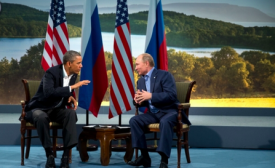syria
Russia’s diplomatic intervention in the Syria crisis has received much praise from politicians and media outlets around the world. In a sense, the praise is deserved: by finally pushing the Assad regime into negotiations, Russia has halted – at least for the time being – a universally undesired military action.
"What's the point of having this superb military you're always talking about if we can't use it?" US Ambassador to the United Nations Madeleine Albright reportedly famously asked Chairman of the Joint Chiefs of Staff Colin Powell when the two clashed over what the United States might or might not do during the Bosnian crisis in 1992.

Russia’s diplomatic intervention in the Syria crisis has received much praise from politicians and media outlets around the world. In a sense, the praise is deserved: by finally pushing the Assad regime into negotiations, Russia has halted – at least for the time being – a universally undesired military action.
Syrian President Bashar al-Assad says he is fully committed to disposing his chemical arsenal, but denies his forces launched a poison gas attack last month that killed hundreds near Damascus. In an interview with the U.S. network Fox News broadcast Thursday, Assad promised to abide by a U.S.-Russia deal aimed at destroying the chemical stockpiles.
The 2008 Republican presidential nominee, criticised Mr Putin and his associates for rigging elections, imprisoning and murdering opponents, fostering corruption and "destroying" Russia's reputation on the world stage.
In many ways, the Middle East makes a strange -- and at times perilous -- hotbed for caricature. Many of the region's leaders have a poor reputation for humor, and often, the list of banned topics makes for a long read. For those that dare to satirize a taboo, the punishments can be harsh: arrest, torture, exile, even death.
It started as “a new beginning” and ended as “America is not the world’s policeman.” Between President Barack Obama’s historic 2009 address to the Islamic world in Cairo to his address to the American people on Syria last week, Obama has zigged and zagged on Mideast policy, angering supporters and detractors alike. But he has stuck to a clear pattern: reduce American engagement, defer to regional players and rely on covert operations to counter terrorism.
Britain should take in more refugees from the Syrian war to ease the mounting humanitarian crisis in the region, campaigners urged. The Refugee Council, Refugee Action, and the Scottish and Welsh Refugee Councils urged David Cameron to establish a "substantial and co-ordinated resettlement programme". Germany has arranged to take in 5,000 Syrians, including women at risk, people with serious medical conditions and others with special needs - and granted them the right to work for two years.







